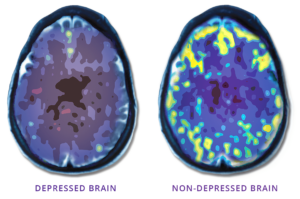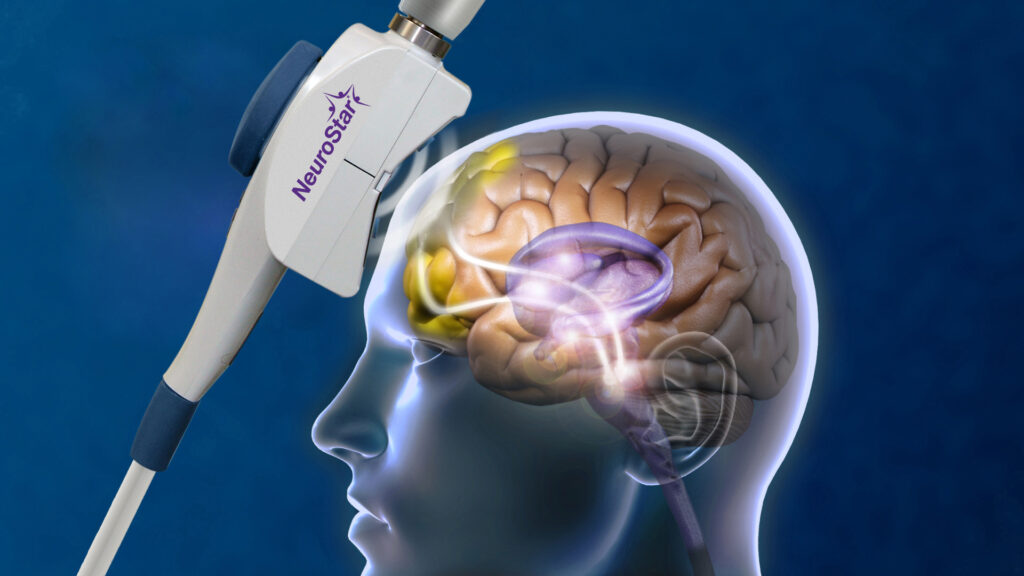Coming Soon!

Does it seem like you’ve tried everything for depression treatment? LightHeart Mental Health offers transcranial magnetic stimulation (TMS) therapy, an alternative for treatment-resistant depression approved by the United States Food and Drug Administration (FDA).
You might benefit from TMS therapy for depression if different methods haven’t worked. Sometimes, TMS therapy for anxiety is also recommended in some cases. Contact our team at 425.800.5688 to learn more about our mental health treatment programs, including our TMS therapy program in Seattle.
An Overview of Our TMS Therapy Program
Transcranial magnetic stimulation therapy is entirely non-invasive, using magnetic pulses to stimulate areas of the brain. This safe, painless, and FDA-approved therapy works differently than traditional treatment approaches.
By activating regions in the brain responsible for regulating mood, TMS therapy has a long-term benefit on depression. Plus, sessions are short and easy to complete at our comfortable and safe clinic. Sessions occur over a few weeks, and you go home without lasting side effects. It involves a series of sessions, typically five times weekly for four to six weeks.

What to Expect in a TMS Therapy Program
Transcranial magnetic stimulation is a non-invasive procedure, meaning it does not require any surgery or medications. Experience a completely painless, stress-free process that is as simple as sitting in an armchair. All the clients have to do is relax and let the magnetic field be administered through a coil on their forehead. Typically, clients report feeling relaxed during the procedure without discomfort or pain.
For a secure, successful alternative to drugs, consider a TMS treatment plan. However, consulting with your doctor about all of the available treatments is essential for you to make an informed decision. If you’ve exhausted traditional treatment options on your journey to healing, LightHeart Mental Health can help you determine if TMS therapy is right for you. We’re here to answer your questions and give you the information you need to find the right solution.
Frequently Asked Questions About TMS Therapy
Is TMS Safe?
Transcranial magnetic stimulation treats your depression without drugs, so it doesn’t have the long list of systemic side effects associated with traditional antidepressant medications. It is different from electroconvulsive therapy (ECT) and has no side effects associated with ECT. Few clients report any side effects, with headaches being the most common. If you experience side effects, our clinicians can adjust the treatment to ensure you’re comfortable and safe.
What Does TMS Therapy Feel Like?
Administering NeuroStar TMS consists of delicately placing a coil on your head. During this treatment, you’ll notice a gentle tapping sensation. Afterward, you can feel free to proceed with the rest of your day as normal without interrupting alertness or memory.
What Ages Can Receive TMS Therapy?
TMS therapy is appropriate for clients ages five and up. Those under 18 are evaluated case-by-case and may be referred for other specialty care from another provider if necessary.
Do You Need a Referral to Be Seen?
No, unless you are required by your insurance to be seen by a specialist. Please contact your insurance provider with any questions.
Is TMS Right for You?
If you struggle with depression, anxiety symptoms associated with depression, or obsessive-compulsive disorder but have not benefitted from your current medications, TMS may be right for you. Unlike other treatments, such as shock therapy or surgery, which can carry undesirable side effects, TMS is a procedure that takes place in-office over six weeks and only requires 19 minutes per daily session.
How Soon Will You See Results?
TMS therapy for anxiety or depression can result in drastic improvements only two to three weeks after commencing treatment. These changes might include a more positive mood, fewer days of depression, and an increased desire to socialize with others. Your friends and family may even notice the effects before you do. To experience long-term relief from depression, it is essential to see through TMS therapy by completing its entire six-week course—this will guarantee the best possible results for overcoming depressive symptoms.
What Are the Real-World Outcomes of TMS Therapy?
A study of real-world outcomes reported an 83% response rate, meaning clients experienced notable relief, and a 62% remission rate, meaning their depression effectively went away. The STAR*D study, the largest clinical trial of MDD, showed that the remission rate decreases with each new medication needed. If you’ve tried three or more medications, the chance of remission was just 7%.
Does Your Insurance Cover TMS?
If you’ve tried medication to treat your depression, but it hasn’t been effective, TMS therapy for depression may be the answer for you. Most insurance plans, including Medicare and Tricare, cover this type of treatment.
Find a TMS Therapy Program in Seattle at LightHeart Mental Health
At LightHeart Mental Health, we’re here to help you find the proper depression treatment for your needs. We offer comprehensive assessments and various therapeutic options, including transcranial magnetic stimulation therapy. Contact LightHeart Mental Health today at 425.800.5688 to get started on your journey toward improved mental health.
